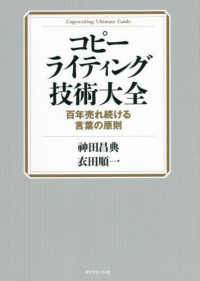- ホーム
- > 洋書
- > 英文書
- > History / World
Full Description
The first book devoted to the the career of anglophone West Africa's most important early twentieth-century statesman and intellectual
The African Gold Coast writer and statesman J. E. Casely Hayford (1866-1930) was a key figure in liberal anticolonial thought as well as African and British imperial literary and intellectual history. In this revisionist account, Jeanne-Marie Jackson positions his career as an intriguing case study of anticolonial literature and politics. Jackson maps the contours of Casely Hayford's thought through sustained attention to his written work within its Gold Coast and British imperial contexts, demonstrating the far-reaching conceptual and aesthetic resources of his elite legal background.
Treating Casely Hayford's 1911 novel, Ethiopia Unbound, as a constitutional document and his legal writings as literary exemplars, Jackson breaks down artificial divisions between African textual traditions. The law, for Casely Hayford and his Fante nationalist peers, was intimately bound to the virtues they attached to textuality: clear-headedness, moderation, restraint, and public discernment. Jackson argues for this liberal disposition as a crucial and neglected part of anticolonial intellectual and political history. Colonial-era legal debates framed the rise of an influential, consummately modern Gold Coast leader deemed fit to steer ambitious new pan-African institutions, and, in Jackson's telling, Casely Hayford emerges as his era's most emblematic figure.








